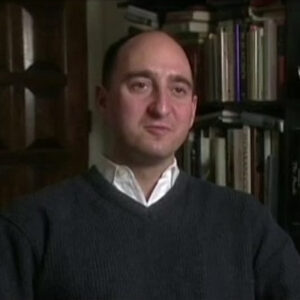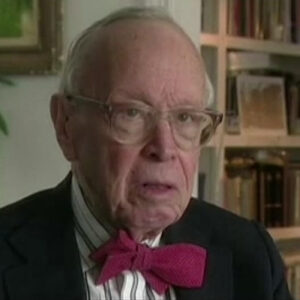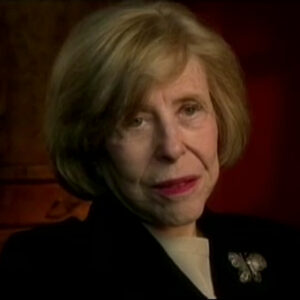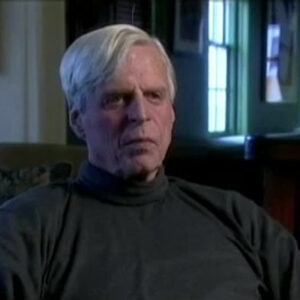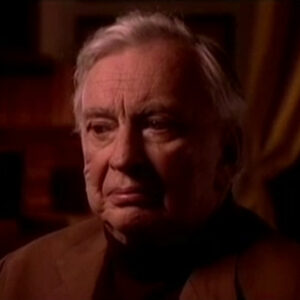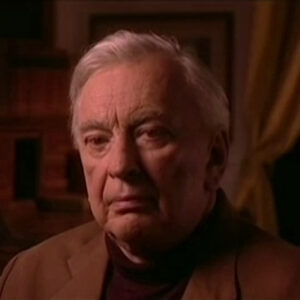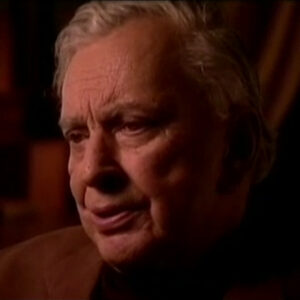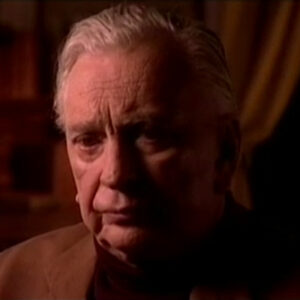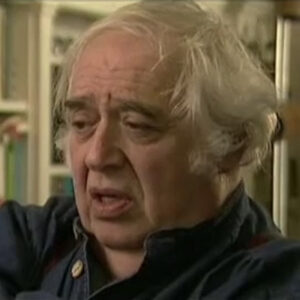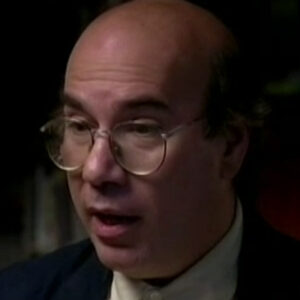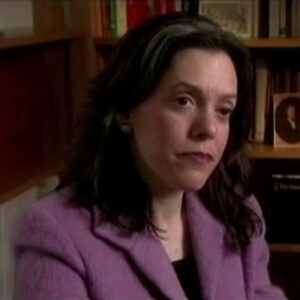Speaker Here is a wonderful script, of course, actually, on Dred Scott and the Dred Scott decision.
Speaker And Gore just did a masterful rewrite on.
Speaker And is and it’s wonderful, it’s a nightmare for the director exceeded total nightmare. But anyway, we got we got some more interesting people in it.
Speaker The thing is, the thing that I’ve got to find, this is what to do about it, because it’s not you know, it’s not a you are there and I can’t use that visual approach. And it breaks the visual pattern that we’ve been using up to now on the Supreme Court stuff. So I’ve just got to figure out what it’ll be style out sort of limbo.
Speaker And you think? I have no idea. And of course, the Supreme Court chamber in the Capitol. Yeah. Which is unchanged since the court met there years ago.
Speaker Where were they meeting him in the 1852 in the capital or bureau’s most beautiful room in the entire capital that I was in that there is just now?
Speaker Yes, it’s a great it’s you know, it’s got a lot of columns. Yeah. It’s not very big.
Speaker And against one wall, there’s a there’s the days the table for the just you know, what makes it so sort of what’s the word magnificent is it’s a perfect cube if width, length and height, they’re all the same so that there’s a kind of unity about it. It’s just, just me. It’s a great room. You’re quite right.
Speaker And the value of, I think doing it this way is. Opening it up with Abraham Lincoln, because Lincoln comes right out of the Dred Scott decision and he’s a lawyer, too, and the great dissenting judge Lincoln tried to get him to run for president. The new Republican Party and what before Lincoln himself joining us and McLain’s that I’m too old. And they met out on circuit everything in there that Lincoln says about McLaine and MacLane him, I’ve got four letters, nothing’s made up. And the Dred Scott decision. Suddenly shoved linking into the election. It meant the extension of slavery, and that’s when he made his great speech. He said, you know.
Speaker A house divided against itself cannot stand. So I’m not saying it’s all going to collapse, but it’s all going to be one thing or the other.
Speaker You think you think it was an emotional commit? I mean, did did they come to him because they had nobody else or because he just felt so intensely?
Speaker I think he just reached for the crown. He had been very upset when he lost the Senate seat to Douglas.
Speaker Douglas had cut his own throat by favoring the Missouri compromise, by opposing it, which had come out of the Dred Scott decision. Right. And that got him into the Senate and defeated Lincoln. Same thing. Lincoln under the White House and defeated Douglass. So the thing meshes so well, those justices sitting there coming to certain decisions that’s being echoed across the country in Illinois. And an Illinois lawyer, a railroad lawyer, just grabs it at the forces at play.
Speaker I mean, you know, you often wonder whether people realize that they are that they’re playing roles in cataclysmic events, you know, where things are so important and and what you feel. Did they know the size of what they were dealing with?
Speaker I’d say self-consciousness was the name of our founders game. George Washington really regarded himself as a monument, you know, long before there was one. He just carried himself like a monument.
Speaker Well, he was right. And I like a sense of security when it’s just about exactly how much information, because I know nothing about Mr. and Mrs. Scott and those children. How much information is there about him, about the kind of man, etc..
Speaker I have not yet been able to find a damn thing that’s interesting. So the principal, the principal, because he’s black, is ignored completely. Totally. It does not matter. Yeah.
Speaker And so with him, I have to sort of make it up other than depositions that he gave along the way.
Speaker And then, of course, the two dissenting justices are so brilliant that they make the case right for us and for the audience. But Scott is a middle aged man by the time all of this happened.
Speaker And I think it’s helpful to bring in Madison Hemings, son of Thomas Jefferson, who was about 48 then.
Speaker It’s wonderful. It’s a wonderful creation using having Hemings for that. Al Gore, what you’re feeling.
Speaker You know, one of the reasons I hope, you know, if the series goes that I love, I love this being in there, maybe even starting with it, is this is something you’ll appreciate then dealing with fallibility.
Speaker You know, I mean, it is, as far as I know, the most egregious Supreme Court decision in the history of the court and.
Speaker I mean, that means so much to you because because, you know, we you are our professional people up.
Speaker After 30 years, I have spent writing seven books covering the story of our great nation from the beginning, right up to the millennium. And this I mean, as it was this suicidal decision, 72. Yeah.
Speaker And then you the the catastrophic results. I mean, the court or didn’t they. Well, did they know or not?
Speaker Clearly, the chief justice, the Maryland man believed in the inferiority of blacks and was going to extend slavery if he could. But the fact that it would bring on civil war, how he had so little imagination just beats me because the abolitionist forces were the best people in the country, the brightest. And he was representing the sort of border states, unsuccessful white farmers. And they just didn’t have the power. They were wonderful soldiers, as it turned out. But the money was with the north and the population of the north. Justice was with the north. Anybody cares? No, no. I think they just played with fire once too often and thought they could get away. Another thing, I was brought up in Washington, D.C., and that was in my youth, a black city, and still is pretty much I think there’s 700000 people of color living there to this day. And once you’re there, you suddenly you’re in Dixie. This is the South and the chief justice is from nearby Baltimore.
Speaker A Southerner and a couple of others were Southern. And I think they thought we can keep our way of life going forever. What difference does it make what we decide here in this chamber, beautiful chamber, Reno and only McClain and Curtis to Curtis is really very and I wish I could have done more with him. Just get the whole point. Where are they from? The north. Get where? The ones from a border state like Kentucky.
Speaker But no, they have is pretty. I was brought up in McLean, Virginia, which was named after him after the dissenting judge, not because he was a great justice. Somebody made him postmaster general. And there was a time when they were trying to think of names for towns around the country. And it got so bad. There were so many towns. They got down to postmaster generals and they named McLean, Virginia, and Fairfax County, where I was brought up after this fellow I’ve been writing about.
Speaker What do you think? You know, it’s interesting what you say about Lincoln and and about becoming the propellant from to go for the presidency. What do you think about this revisionist history that he wasn’t really interested in antislavery, that.
Speaker I wrote a book about it called Lincoln, which is quite clear that he certainly was not an abolitionist and black historians are very much aware of that, that he wasn’t an enthusiast, he was a legalist. And he said, look, property is property and is sold into slavery. The founding fathers have said slavery, slaves are property. And that’s that. Of course it’s wrong, but it’s there. I must follow the Constitution. Unlike the people on the court today, Lincoln thought you had to obey it. So he said, I’ve never had the power to abolish slavery. Then they get into the Civil War, which is about not extending it in the new states that were coming into the union. And he still said, I can’t free them. And the Brits were about to come in the war on the side of the Southerners, Lincoln said. If you do know there will be war, we will fight. So they held back.
Speaker And then he found a clause in the Constitution that covered him in case of invasion or the arrival of Osama Saddam in Manhattan, one can protect oneself out of military necessity. And he used the phrase military necessity to free the slaves.
Speaker Really? That was the name of the Emancipation Proclamation? Yes. Based on that, yes. Entirely because he had no other legal reason to do it.
Speaker And it was totally illegal under the Constitution, the original constitution. So he interpreted military necessity, being I free of slaves in the South, they will rise up against their white masters and help us defeat them. That was his rationale. On the other hand, he did not free the slaves in his own section of the union to places that had stayed loyal, like Louisiana. So he was much criticized that they were free on the part of the union over which he had no control and slavery in his own party existed. So, I mean, he’s a wily operator. You’ve got as close as he could to illegality. Then just at the entrance before he was killed, he he hustles to the Senate and says, you’ve got to free all the slaves. It make will make a constitutional amendment. And the Senate agreed. And then they passed it on to the legislatures of the various states and they all agreed. And that was the 13th Amendment which freed the blacks.
Speaker Then came the 14th, which is very important, which makes sure that everybody has the rights that were given them and the original Bill of Rights being gradually taken from us.
Speaker You know, what’s so heartbreaking is that this whole struggle, as you know, goes back to the writing of the Declaration of Independence in the original constitutional convention, and we’re still living with it today.
Speaker Well, it was a seven show, you know, and the plus was that a great man. Jefferson thought of something new that nobody else, no other nation has ever been formed on its promise to its citizens of life, liberty and the pursuit of happiness.
Speaker The original formulation was lock, and it was life, liberty and property where conservatives have never liked pursuit of happiness and they love property. And the court always represented property and not human rights of white or black or green. They didn’t give a damn property, was what the game of the court was all about. So Jefferson just idly throws this revolutionary notice into what is the the the creating document of a nation that was not going to be like any other. And the world was stunned. I mean, the French, it was it really, I think, brought on the French Revolution, the rights of man, which is a copy of what Jefferson did and goes even further in some ways. No, it was. But, you know, the snake was in the Garden of Eden from the beginning and it was slavery.
Speaker And the problem still with today. You think?
Speaker Out of sugar, which was the beginning of slavery, you know, and out of spices, which was the beginning of imperialism and Europe’s control of Africa, the simple things that have to do with taste, with physical taste. Yes. These incredible.
Speaker Evils that God knows how long it’ll ever take us to eradicate any.
Speaker Took place, put a clove in that house.
Speaker First of all, it was everywhere, you know, during the war I served in India and in a same province and literally the spice markets.
Speaker I mean, when you go by and you see those burlap sacks turned down around the edges and the yellow and the green, red and white and, you know, the sight of them is so glamorous.
Speaker And and it took me a while to realize that this is what all those caramels were setting out to find, you know, from Lisbon and Genoa and the Holy Grail for all the world was the Westinghouse refrigerator.
Speaker My very first play on live television, Dark Possession, was Geraldine Page. Geraldine Fitzgerald. What was her name? Who opened up the icebox furnaces and very furnace and terrified when in the control room. And everybody’s forgotten. Their lines were sweating. Ice, as always, and very furnace sweeps into this great sort of dirndl. Just a couple of spins and some legs already.
Speaker Good legs. Yes. We called it the Loretta Young spin, Loretta Young spin.
Speaker And she’s been in Spain and Spain. And now I press the magic button.
Speaker I press the magic, but I press the letter.
Speaker You are actually I think they’ve got a crowbar trying to get the door of the Westinghouse refrigerator open. Well, the next day, the show made the front page of every paper in the country, but no mention of my work in that Westinghouse. Well, that took the place of the clothes and the spice trade, but that was a long time later.
Speaker They couldn’t preserve before I could get I could do a script of yours on live TV. I don’t think so.
Speaker No, we did the best of Broadway. Right stage door together. Right. And we did a movie together.
Speaker But I mean, we never did. You are they were in danger together.
Speaker No, I never did either of I did suspense. I worked with Mulligan there and Studio one and then mostly Philco. But you weren’t doing Philco?
Speaker No, I was under contract to CBS. So and FIELKE was an NBC show that I was taking a mulligan and I were hired the same day. Yeah.
Speaker Made out a W-4 forms together and then worked in adjoining control rooms at the Grand Central Station at Grand.
Speaker That’s where that’s where we did suspense. Nobody can ever believe that they were television studios and they can’t leave. And they can’t believe that in one tiny office there was. The big Marty Manual’s no, no man, Rick, Marty, Marty with Marty Ritt, very, very large guy and a very small desk, which he shared with Yul Brynner, was also a director.
Speaker Marty was the producer, used the director and I was yours.
Speaker And, well, I remember the three of you crowded around this tiny desk as I came in. That was just before Yul Brynner did being alive.
Speaker And he was he was almost afraid to take the contract for King and I, because for the first time in his life, he was earning a steady living. And he was a very good director, by the way. I had a good visual sense.
Speaker And, you know, you had been through some very humiliating circumstances because, you know, it’s nonsense about him being a Mongolian. He, of course, like to say that he was Swiss and the same.
Speaker They had every right to be bad.
Speaker And so but he used to play the Mongolian bit because when he was when he wasn’t getting shows and there were not many plays them for Oriental actors. And so he used to work parties. He used to work dinner parties at rich houses and had spent many, many evenings eating in the kitchen. And so that the the suddenly earning I think the union minimum was 385 dollars a week if you were doing an hour show and to be earning that steadily and because he was a really good director, CBS put him under contract for four or five years. And so he had great doubts about taking the cutting off.
Speaker Yeah. But once an actor, a good career, wonderful career, I love I love what he went to Hollywood and, you know, his first picture was going to be for Dumbell and they said, you know, hear he’s a bit of a monster.
Speaker You know, they haven’t seen a theater to like about this, but he brought them to their knees that he did the first the first day of shooting.
Speaker He did not appear on set until the Velvet appeared on said.
Speaker Since decorum, yeah. But what’s very interesting, and Gore has caught it so marvelously, is even in the in the direct transcripts, how some element of personality comes through. In terms of the lawyers themselves and the justices in in the woman who’s arguing Roe v. Wade, she is so nervous you can see it in the text and how and how the members of the court or the ones who are sympathetic to her are trying to help her.
Speaker And they’re picking up lines. And she said, well, such and such a case, the judge decided when she just dries up. Yeah, yeah. And one of the justices, Judge Simon. Oh, yes, yes, yes. Thank you. Thank you.
Speaker Judge Simon said, baby, but you can’t all that. And you see, I think that’s going to be fascinating for an actor. I think it’s enjoyable for an actor. Oh, yeah.
Speaker Forget the subtleties of character within a rigid, legalistic speech and really good actors, as you know, like experience actors. I mean, it’s people like Trappes, verbal traps for each other, which the justices are doing for each other, as well as for the defendants and prosecutors in front of them. So they just leave them on the new M.O. that and they get the guy to contradict himself and gives great pleasure to everyone.
Speaker And I love it also Gore, that sort of pose of. You you you know, just of their backgrounds and the way their past voting records, where their sympathies lie, you know, you know, conservative middle brother, et cetera, and how often they try to they think they’re disguising it by being rough on the attorney, that they will eventually back, you know.
Speaker A boy, the two sessions I attended was so fascinating and cases could not have been duller, they were both tax cases, but just to see the way it was working and there was it was really extraordinary and very moving.
Speaker Does any other country have the equivalent they have a Supreme Court, but does it have the theoretical one third of the power of the government that our court does?
Speaker No. Others, others think about it. I think recently they may have changed their minds and the cord can get loose, get out of its box, which is always one of the problems of November 2000, was that it terrified a lot of legal people. You know, the court is going to get mixed up in elections. They’re not supposed to do that. They’re supposed to be helpful to, you know, make things easier for the voters around the country. But in the beginning, you know, they did nothing but admiralty suits, that’s all they did, which are the form of law.
Speaker You have to drag somebody onto the court. You know, they’d rather do anything rather than make sure it was not carrying yes or no.
Speaker It was not Entrada, you know, and they did a lot of admiralty suits.
Speaker It’s like it’s like when you when you read the tour and if one if the cow dies and a quarter of it is on your property line and three quarters of it is on my property line, I’m responsible for burying the cow. The Talmud is for Talmud. Great wisdom. It’s full of stuff like it.
Speaker It’s the father of law, the Philadelphia.
Speaker The assassination of live television was it was live as you watched it, the actors were acting, you had three cameras and the sets were preordained. You had exactly one week between the first reading and when you won, the telecast went out. And it was just a desperate time. And also the commercials were done by. Can you imagine a great corporation like Westinghouse saying, oh, yeah, a couple of actors can go out there and open and shut doors. Nothing can go wrong, can it? Well, it did go wrong with my play and very for that it was the most the greatest opener and shutter of refrigerator doors in America. And she just said with this coy look right into the camera and now I’m going to build a refrigerator. Is there like an Adonis, like the husband she always wanted? And now I’m going to press the magic button. And then this terrible clanging going on off out of camera range as they’re desperately trying to open the door for which they did with a hatchet and she claws it. That’s the end of it.
Speaker I would have liked to have seen it happen. You remember Westinghouse used to sponsor the conventions and and I would have loved to have seen it happen at a political convention because those commercials were done live at the convention as well.
Speaker It had a little corner and the Westinghouse refrigerator was sort of treated like the Buddha.
Speaker Yes. You know, it looked like a little God sitting there and not kid. It was paying the bills, everything nicely illuminated.
Speaker And she would leave her trailer and held high. Great Lakes High Priestess famed for.
Speaker And she had a gentleman friend who was a cameraman.
Speaker And they met every Westinghouse where we were on Monday night, Studio one, studio one, you know, that was Westinghouse.
Speaker So every Monday I knew, you know, the gossip. I knew, you know, the. Yeah, I didn’t know any of that. Well, I was nervous because you were on another network. We were the sexy channel and their love affair. And I thought of them as Antony and Cleopatra.
Speaker You know, it was interesting also Gore about in in the blacklist time. NBC could have actors and writers and directors at CBS could not have had that. There was a difference in the way the blacklist treated the two networks.
Speaker That always was the case, and you remember the 14th floor or whatever it was, which meant that you hadn’t passed through the sensors. So if you wanted Gail Sondergaard, you know, who was always on the black list, you’d have to wait. Then you’d send her name up to three months later and she was OK. And then, of course, there was the butcher of Schenectady guy who would refuse to sell anything but just by an un-American actor, writer and director and yes, a reign of terror.
Speaker You talk about small things that become so, so enormous.
Speaker He was a supermarket owner, as you know, and he would simply put you off the shelf and terrorized part of the networks of one supermarket.
Speaker Well, we had it also when we both came to the movies, we had it with the Legion of Decency, as it was sometimes called. But it was a Catholic. Organization in which a monsignor was the head of it, rather nice and quite civilized, but, oh, boy, you couldn’t do sex, you couldn’t do it. And one of his largest muscle was not just his Catholic parishioners telling them not to go to the movies because they didn’t pay much attention to what he said about that was Joe Kennedy, Joe Kennedy, who was thick with Cardinal Spellman and with the his eminence Boston. O’Connor, he was. They would pass the word ban baby doll by Tennessee Williams and Joe Kennedy did, and he had 230 theaters and he was involved in the financing studios as well. So, I mean, he was all over the place. So that was the source of certainly their power. Jack Kennedy said something very funny when it was pointed out to him in my presence that you don’t have a lot of trouble with Cardinal Spellman and. The various princes of the church. And Jack, I know I don’t have them, but I’ve got the sisters, we’ve got the votes, the.
Speaker I was wondering more is how did you stay up and not being blacklisted, were you not as radical in those days?
Speaker I probably was, but I had not gone through anything. No, I never joined anything. And I didn’t even know about all these things.
Speaker He wouldn’t join any club that would have I would blackballed immediately if I.
Speaker No, not having joined anything and coming from a totally different world, I came from a political family in Washington which I don’t think any other political kid went to. Into tough showbiz, which is what we were doing, we really were. The construction workers of the American imagination with live television. Other grander people were on Broadway and.
Speaker So you think Al Gore. You know, I don’t know what they might have known about your family and where you came from and so on, but because generally they most of the time, until they got to movies, certainly in television, they were taken care of nothing but small fry. And there was nothing but a small fry on television and live television. You think that you might have represented something maybe a little bit too powerful for them to go after?
Speaker Could be. No, nobody knew anything about my family at all.
Speaker But, you know, Senator Gore and Gore Vidal and and they knew you belong there.
Speaker Well, it could be people like Martin Manala’s which would find these things out. You know, nobody else would know. But I think your characterization is quite correct. Small fry, we were I mean, this was the 20 inches wide screen.
Speaker Are you kidding that that would be in Bill Paley’s home at their normal home was literally an 11 inch screen.
Speaker Amazing that they did it at all. It’s and and that good work came out of it and not just.
Speaker Good for television, did good work, period. Well, they needed so much, but it also told me something else, Gore told me that because I’m and I’m sure it’s true today that that amount of talent you, me, Bobby Mulligan, the actors, Paul, Joe and all of that is always there. That pool of talent is always there, and all it needs is the opportunity to work and bang it’ll pop up.
Speaker I mean, when they talk about the golden age, it’s silly in the sense that any age can be a golden age if the only give people a chance to work.
Speaker And it’s a pity they haven’t stumbled across that great truth in recent years.
Speaker Well, there are so many things at stake now, not the smallest of which is a lot of money.
Speaker And so, as usual, everybody goes for the tried and true thing.
Speaker Well. We never knew what the tried and true thing was.
Speaker It didn’t exist. Nobody knew enough to say no, no.
Speaker The sitcom had not been invented, which is what killed us in the end because they didn’t want live dramas. Might be too interesting. I remember being given a note with around the time of my first plays on television from the advertising people who controlled. They said the secret really is is.
Speaker If your prayers to interesting first access to interesting. They’re going to resent the commercial at the break. So I said, well, what am I to do? Just don’t make it too interesting. I said, But if it isn’t interesting, they won’t go on the act too. Well, they. Well, they usually do, we know how to do that, and then we did the flush, right? We checked the reservoirs in every major city and at the act break. If there’s an awful lot of flushing going on all across the nation, it’s it’s going well. It’s exciting. I mean, they’re not going anywhere. On the other hand, the downside is they’ll hate having to get up there and make, you know, even the even the sitcom’s had their own kind.
Speaker I’m not ashamed to use the word majesty, a friend, friend of mine here. You know, we just finished shooting yesterday.
Speaker And look what they brought me as a as a as a present for teams of Sergeant Bilko.
Speaker Oh, well, you know, now not Hichem. Boy, did he know where the jokes were when he could go. And Phil Silvers was so wonderful.
Speaker And a group of comedians, you know, and again, nobody dared say no. Nobody said no to them because nobody knew how. And there was nothing. You can’t do that. It’s a bad image of the army or what have you. Just great, great clowning.
Speaker And as well as Ed and Jackie Gleason’s show, when it began, had great clowns about it. And Lucy had great clowns, even though it was the first filmed television show with Gleason was on tape and Gleason was live.
Speaker And Doko was like, well, self-consciousness, which our founding fathers made an art form of and made out, was very, very bad in the dramatic arts. Self-consciousness is what ruined everything. Well, it’s got to be like Lucy now. All you need is a funny woman, you know, and put her in this funny, funny domestic situations. And once they became conscious of that, I had an experience recently with CBS. They wanted to do an old movie and catered affair. And I had brought it up to the present day and the script worked fine. I could see that they wanted to destroy it, and yet they just said we don’t. We’ve decided not to do it now. Now. Well, they were coming up with rules that had been invented in the 40 years since that was a successful film. And I said, you mean nothing, you not talk about storytelling, I don’t know what you’re talking about. They have to you know, they’re 14. I think it is commercial breaks, 40 of them. Well, they time them, they have executives sitting there measuring the wordage and timing it to make sure it’s exactly right, the break assembly to make a break whenever you feel like, oh, no, no, no, you’ve got to prepare for it. I said, well, we never did. And we had more than you did. Well, and then I thought, this is total decadence. This is an art form of sorts, and it’s a living entity when it works and these people are embalmer’s, they shouldn’t be in the business. How they got there, I don’t know why they’re there. I don’t know. And their work certainly is not causing their corporate masters to live well. No.


